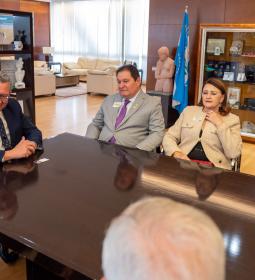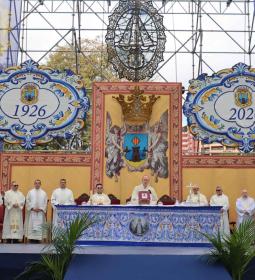The honoree focuses his research on the fight against climate change and the protection and defense of the environment
Benidorm awards the 'Distinción Europa' to the scientist Javier Pérez-Ramírez from Benidorm in a solemn act in the Plenary Hall

Benidorm City Council delivered today in a solemn act held in the Plenary Hall the 'Distinción Europoa' to the scientist Javier Pérez-Ramírez from Benidorm, who since last March is a member of the Royal Academy of Exact, Physical and Natural Sciences from Spain. An acknowledgment that was unanimously agreed yesterday by the Board of Spokesmen and that the mayor, Toni Pérez, transferred yesterday to the winner, who during these days is in Benidorm.
Javier Pérez-Ramírez is a Professor of Chemical Engineering at the University of Zurich. His research focuses on catalytic materials and process concepts leading to technologies for the zero-carbon manufacturing of chemicals and fuels. He is also a co-inventor of 24 patents.
In his speech, Toni Pérez highlighted the importance of culture and science "to build the new Europe" and stated that both science and the European Union have common objectives because "both are corporate and seek advancement and progress ”. He has also highlighted Javier Pérez-Ramírez's "work for humanity" and "the many hours of dedication" while he has hoped that "at least one of his achievements will change the world."
The mayor meant that the delivery of the distinction has been accelerated "so that you can pick it up in this Sala Magna in which the decisions of the future of your town are made."
The scientist, for his part, thanked the City Council for "this immense honor that recognizes my scientific career" and admitted to being "still in surprise mode" for a distinction "which is a responsibility to continue my work."
Pérez-Ramírez also referred to the global problem of the environmental footprint and CO2 emissions "which must be stopped to avoid dire consequences that jeopardize the future of coming generations". In this sense, he explained that in barely 100 years, the Holocene "a period of 10,000 years with very constant temperatures" has passed to the period called the Anthropocene, "which is called that because it was caused by humans, the first time that a change of time is not caused by a natural phenomenon”.
In his speech, he criticized the linear economy, "which is one that plunders natural capital to manufacture products that are not intended to be used after their useful life" and has advocated providing society with "circularity", that is, recycling, reusing and reducing the waste we produce, for which "there are tools such as catalysis", which is what his research focuses on.
He also urged us to understand sustainability as a triangle whose vertices are science and technology, society and the economy "in which all have to go hand in hand".
Finally, he asked society to "understand researchers as the impartial link between the industry and the political decision-makers, and that sometimes we are wasted because they do not give us a voice." For this reason, he concluded that "science is the best investment that a country can make to lead the transition towards sustainability."
Throughout his career, Javier Pérez-Ramírez has received numerous awards, including the Otto-Roelen Medal in 2012, the EFCATS Young Investigator Award in 2013, the Beilby Medal and Prize in 2014, the RSC Sustainable Energy Award in 2017, the Paul H. Emmet Award in Fundamental Catalysis by the North American Catalysis Society in 2019, the EFCATS Robert K. Graselli for Catalysis in 2021, and the RSC Horizon Prize John Jeyes Award in 2022.
With this 'Distinción Europa' award, Benidorm recognizes the meritorious career of the professor and scientist, who has developed especially in the international and European arena and who, as he has made clear, is largely oriented towards research and development against climate change and in defense and protection of the environment.
Every year the City Council grants this distinction on the occasion of 'Europe Day', which is commemorated on May 9.





